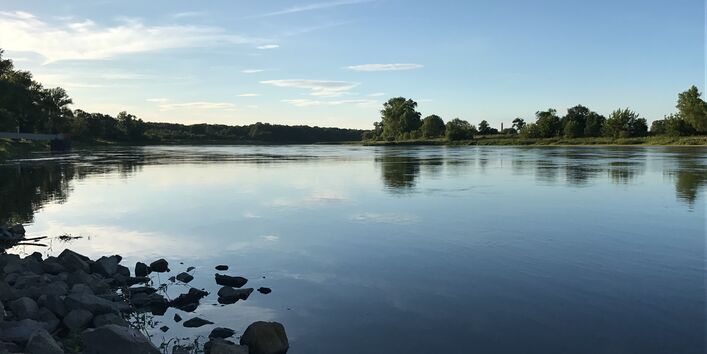German Environment Agency assisting Brandenburg and Mecklenburg-Western Pomerania with research on causes of the Oder River crisis
Federal Environment Minister Steffi Lemke has commissioned the German Environment Agency (UBA) to collect all available data, tip-offs and hypotheses concerning the mass die-off of fish in the Oder river and carry out a systematic evaluation of the information with experts from other authorities in Brandenburg and Mecklenburg-Western Pomerania. The aim is to determine the exact causes of the environmental disaster. An assessment report will be handed over to the environment ministries after completion. Findings will also be discussed closely with Polish expert colleagues. UBA Vice-President Lilian Busse, who is heading the appointed Polish-German working group, says: "The atmosphere in the group is collegial. We have good discussions about the research results from both countries. The whole thing is a highly complex puzzle that we hope to complete in the coming weeks." The causes of the mass fish die-off remain unclear three weeks after it began.
The Brandenburg State Office for the Environment (LfU) launched water tests in response to the fish die-off in the Oder river. The LfU’s automatic measuring stations in Frankfurt/Oder and Hohenwutzen recorded sudden increased levels of electric conductivity, pH levels and oxygen concentration. The monitoring programme for specific hazardous substances, which the EU Water Framework Directive requires for assessing the condition of rivers, did not record any unusual concentrations in Germany.
The Federal Institute of Hydrology (BfG) is applying special methods in its current analysis of water samples which enable identification of more than 1,000 substances including many previously unknown chemicals. The testing regime can also detect toxic algal metabolites (algal toxins).
The expertise at hand will be used to evaluate the delivered data and test results. The hypothesis that mercury poisoning was the cause of the fish die-offs has already been refuted. UBA also believes that increased concentrations of certain pesticides are an unlikely cause. The LfU has initiated investigation of the presence of an alga that produces fish poison in connection with the increased salt concentrations that have been detected. Further investigations are expected to bring clarity.
Based on the available data, the UBA considers an acute risk to human health, for example when bathing, to be very unlikely. Experts from the federal and state governments continue to advise against eating fish from the Oder. Local advisory measures, such as bathing bans, must continue to be observed. Commercial fishing in the Oder should be suspended until there has been determined that the fish are safe to eat.
The rapid escalation of the crisis has revealed the need for quicker early warning systems and more comprehensive water monitoring. After the Sandoz accident on the Rhine in 1986, the International Commission for the Protection of the Rhine installed a network with state-of-the-art procedures for measuring chemicals and regularly publishes the results on the internet. The Oder river, however, needs to improve mechanisms for a more timely response to acute levels of water pollution.
Europe's rivers have been suffering from stress for years: high temperatures, drought, and low water levels are conditions that affect animals and plants. Any introduction of additional stressors – high chemical concentrations or extreme algal blooms – can destabilise the entire ecosystem. "This disaster also teaches us that we need to strengthen the resilience of river basins and their biotic communities in the face of climate change and multiple stress factors," said UBA Vice President Lilian Busse.
